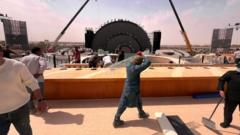NGOs urge authorities to enforce safety protocols amidst a problematic labor environment for migrant workers.
Surge in Migrant Worker Deaths Raises Alarms Ahead of Saudi World Cup 2034

Surge in Migrant Worker Deaths Raises Alarms Ahead of Saudi World Cup 2034
Human rights organizations highlight increased fatalities among construction workers in Saudi Arabia as critical infrastructure projects begin.
Human rights advocates are sounding the alarm over a significant rise in deaths among migrant construction workers in Saudi Arabia, coinciding with the nation’s ambitious plans for the World Cup in 2034. Reports from Human Rights Watch and FairSquare have highlighted ongoing fatalities attributed to preventable workplace accidents, emphasizing that many deaths are misclassified as resulting from natural causes, leaving bereaved families without compensation.
As Saudi Arabia gears up to host what could be the largest and costliest World Cup, with plans to build 11 new stadiums and a comprehensive transit system along with a plethora of hotel accommodations, concerns about worker safety have escalated. "If the necessary measures are not taken, the World Cup could come at an excessive human cost," warned Minky Worden from Human Rights Watch.
These warnings surfaced shortly after FIFA President Gianni Infantino’s visit to Saudi Arabia, reflecting a growing international awareness regarding the rights of migrant workers under severe conditions. Despite FIFA’s claims of commitment to human rights, evidence suggests a failure to address worker safety lessons learned from the preceding World Cup in Qatar.
Challenges persist in acquiring accurate data on migrant fatalities in Saudi Arabia due to limited access for rights groups and the ban on labor unions. Human Rights Watch's investigation into the deaths of 31 workers, mostly from South Asia, revealed harrowing accounts of accidents caused by falls, electrocution, and machinery failure.
Moreover, issues like extreme heat exacerbated by intensified construction activities pose additional risks to these laborers, many of whom are receiving substandard treatment from local healthcare systems. A recent tragedy involved Muhammad Arshad, a Pakistani foreman, who fell to his death at a stadium site in Al Khobar, marking the first reported fatality linked to World Cup preparations.
While the Saudi government and FIFA have touted advances in workplace safety, labor groups assert that preventable injuries have spiked significantly. The global construction workers union, BWI, criticized the systemic negligence and lack of transparency regarding worker fatalities, with General Secretary Ambet Yuson condemning the absence of accountability.
FairSquare co-director James Lynch denounced the inadequate responses from the Saudi health system and governance that neglects migrant workers’ rights, branding FIFA's human rights policies as effectively indifferent to the tragedies occurring in the lives of these laborers and their families.
In a recent communication, FIFA proposed creating a welfare system aimed at upholding worker rights in its upcoming projects. However, detailed plans outlining the efficacy of these proposals remain vague. Human Rights Watch insisted on the necessity for thorough investigations into all migrant worker deaths and called for the dignified treatment and compensation of their families, demanding accountability from both Saudi authorities and FIFA amidst rising concerns for these vulnerable workers' safety.
As Saudi Arabia gears up to host what could be the largest and costliest World Cup, with plans to build 11 new stadiums and a comprehensive transit system along with a plethora of hotel accommodations, concerns about worker safety have escalated. "If the necessary measures are not taken, the World Cup could come at an excessive human cost," warned Minky Worden from Human Rights Watch.
These warnings surfaced shortly after FIFA President Gianni Infantino’s visit to Saudi Arabia, reflecting a growing international awareness regarding the rights of migrant workers under severe conditions. Despite FIFA’s claims of commitment to human rights, evidence suggests a failure to address worker safety lessons learned from the preceding World Cup in Qatar.
Challenges persist in acquiring accurate data on migrant fatalities in Saudi Arabia due to limited access for rights groups and the ban on labor unions. Human Rights Watch's investigation into the deaths of 31 workers, mostly from South Asia, revealed harrowing accounts of accidents caused by falls, electrocution, and machinery failure.
Moreover, issues like extreme heat exacerbated by intensified construction activities pose additional risks to these laborers, many of whom are receiving substandard treatment from local healthcare systems. A recent tragedy involved Muhammad Arshad, a Pakistani foreman, who fell to his death at a stadium site in Al Khobar, marking the first reported fatality linked to World Cup preparations.
While the Saudi government and FIFA have touted advances in workplace safety, labor groups assert that preventable injuries have spiked significantly. The global construction workers union, BWI, criticized the systemic negligence and lack of transparency regarding worker fatalities, with General Secretary Ambet Yuson condemning the absence of accountability.
FairSquare co-director James Lynch denounced the inadequate responses from the Saudi health system and governance that neglects migrant workers’ rights, branding FIFA's human rights policies as effectively indifferent to the tragedies occurring in the lives of these laborers and their families.
In a recent communication, FIFA proposed creating a welfare system aimed at upholding worker rights in its upcoming projects. However, detailed plans outlining the efficacy of these proposals remain vague. Human Rights Watch insisted on the necessity for thorough investigations into all migrant worker deaths and called for the dignified treatment and compensation of their families, demanding accountability from both Saudi authorities and FIFA amidst rising concerns for these vulnerable workers' safety.





















